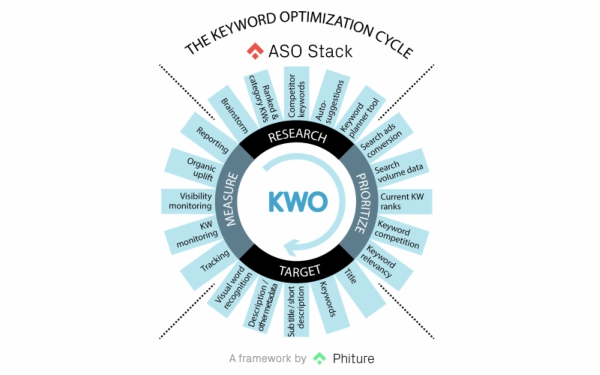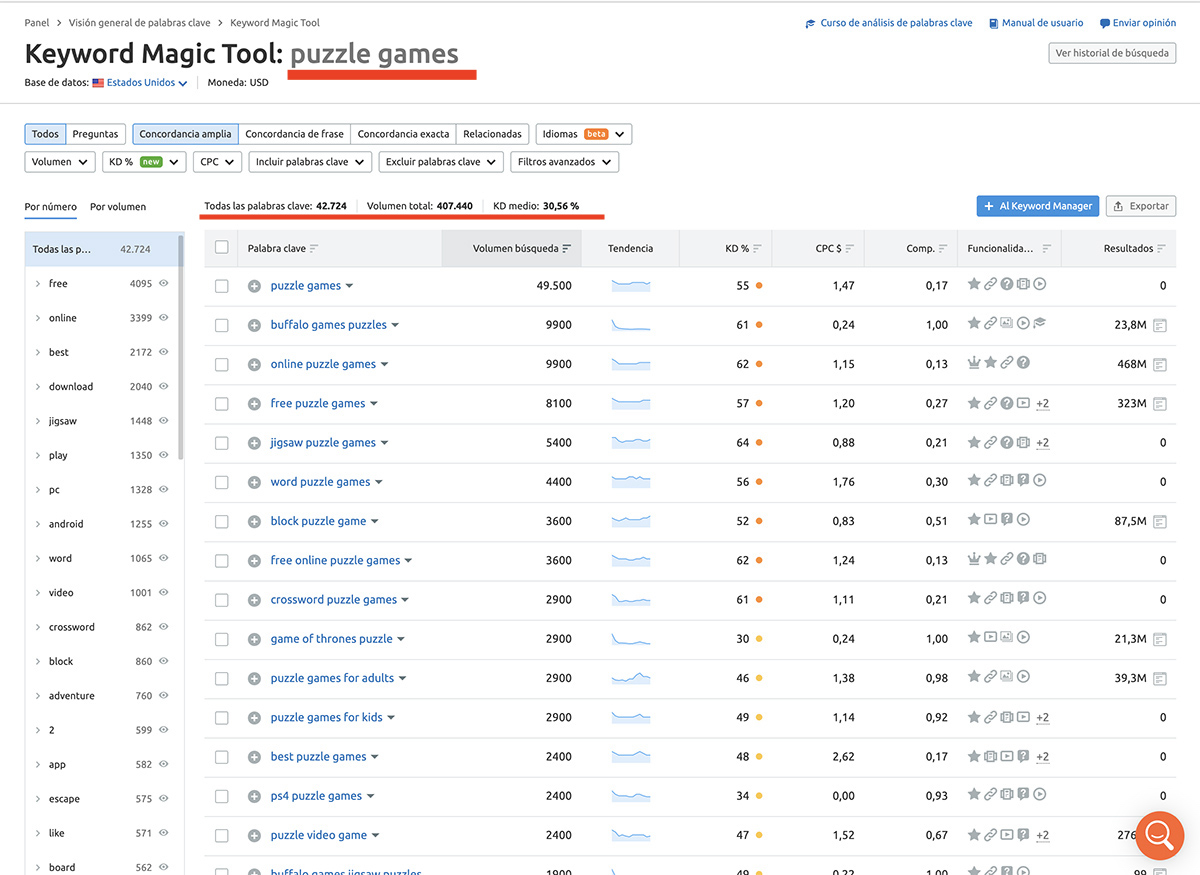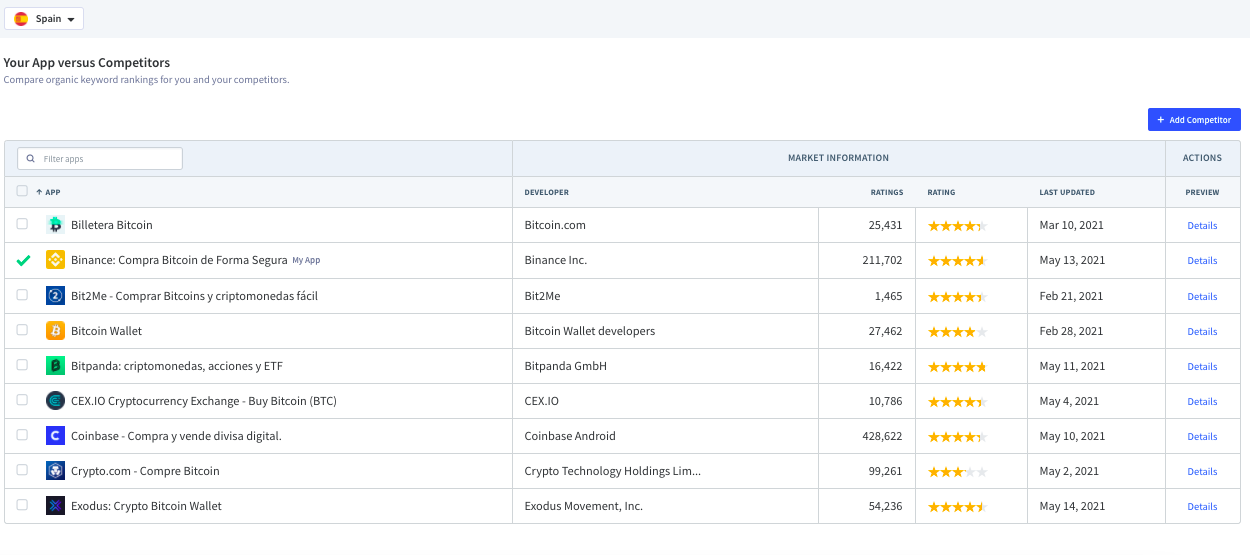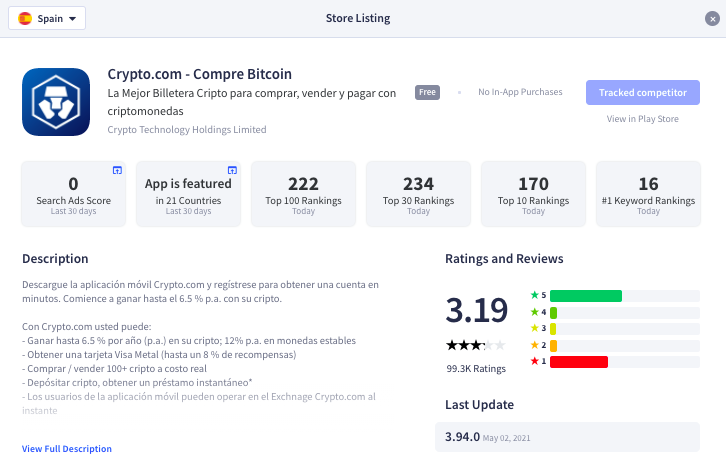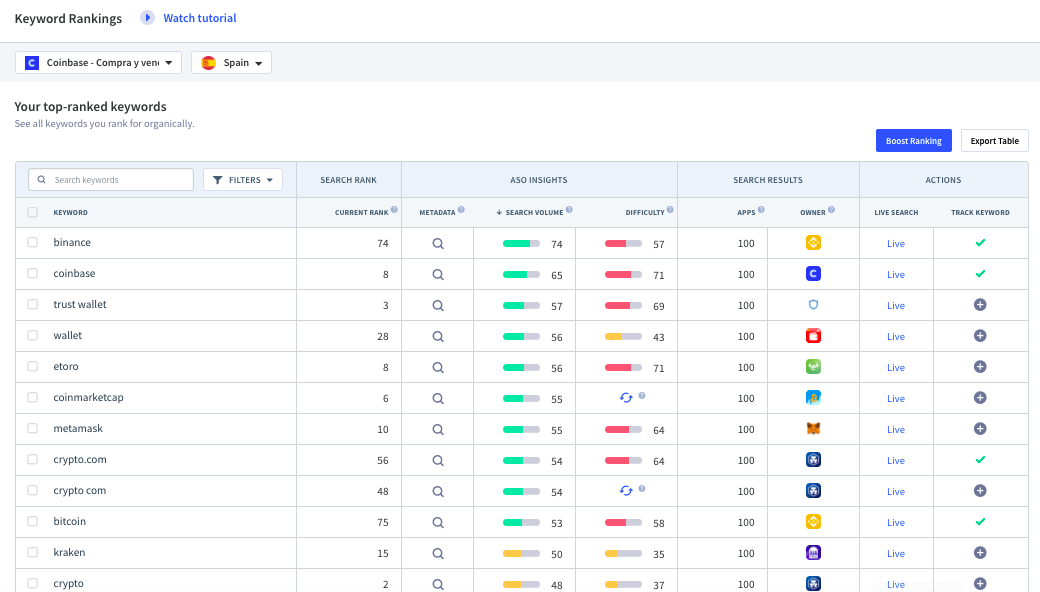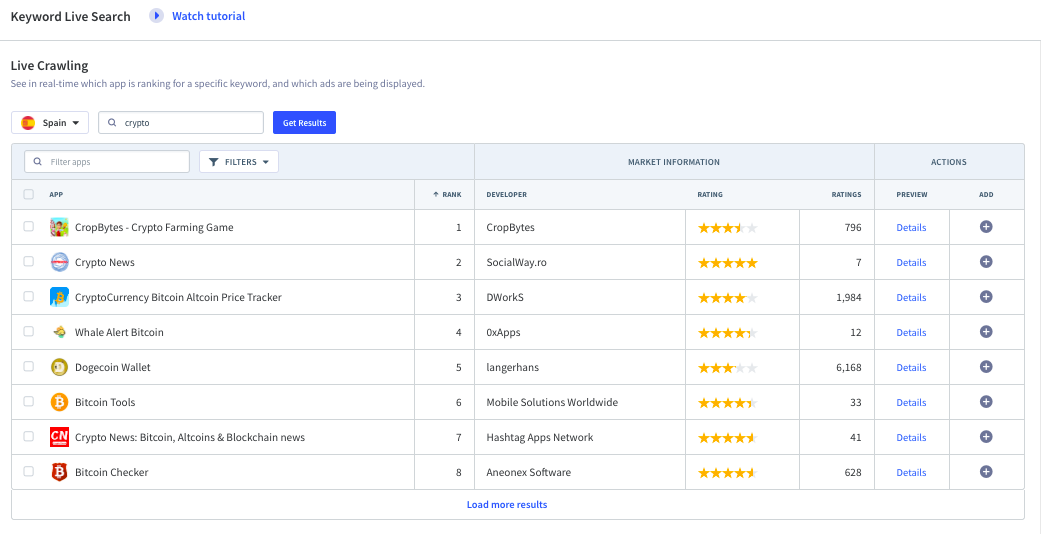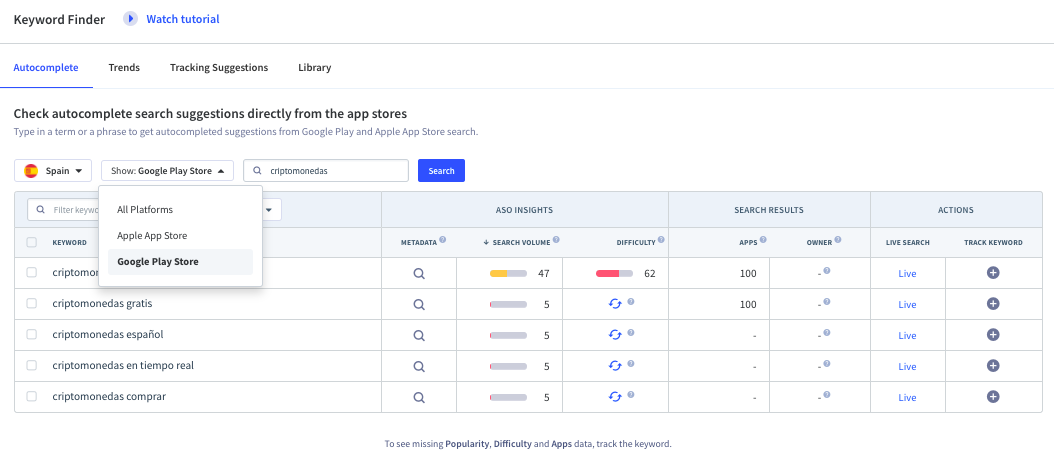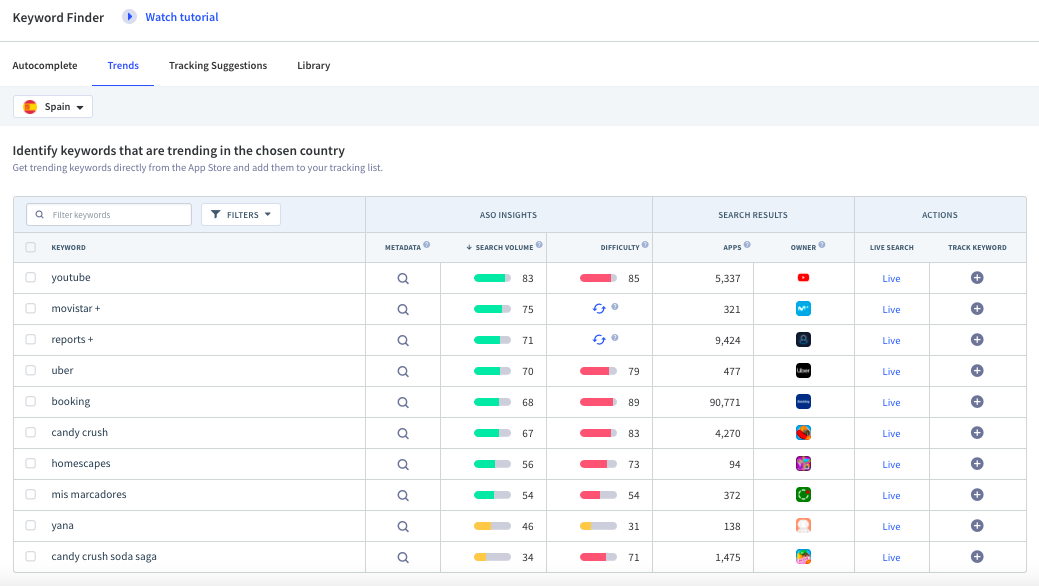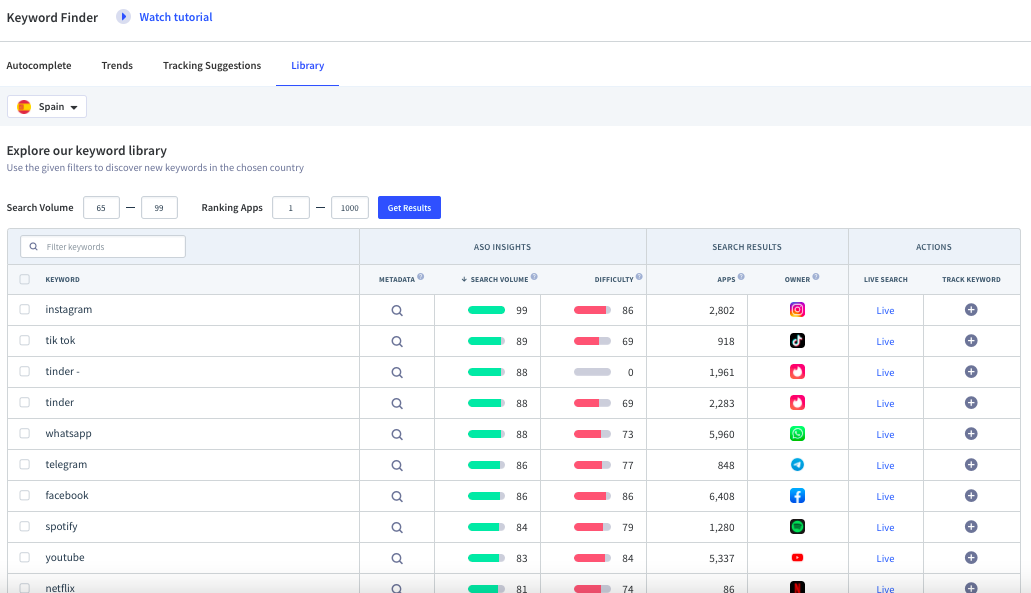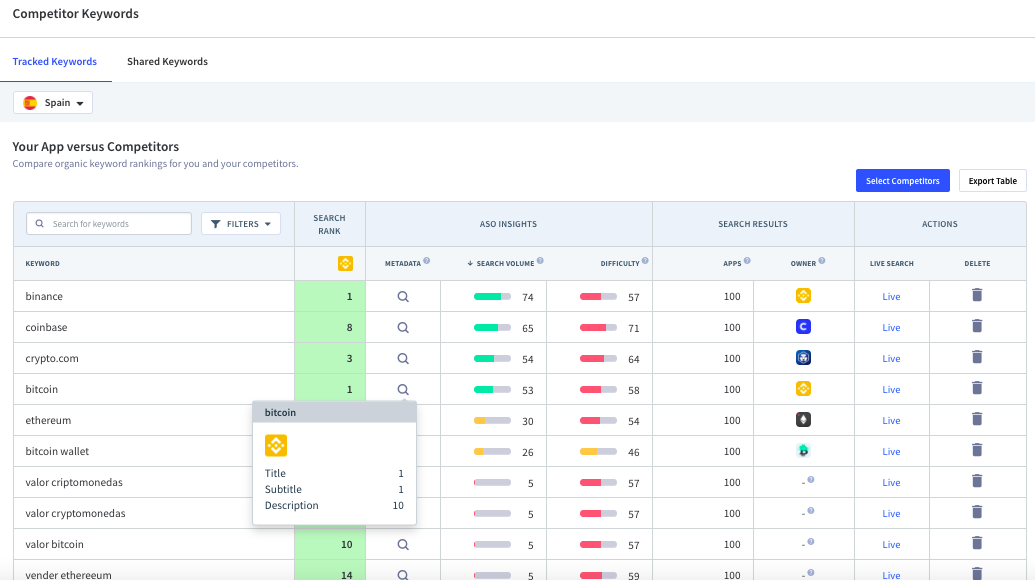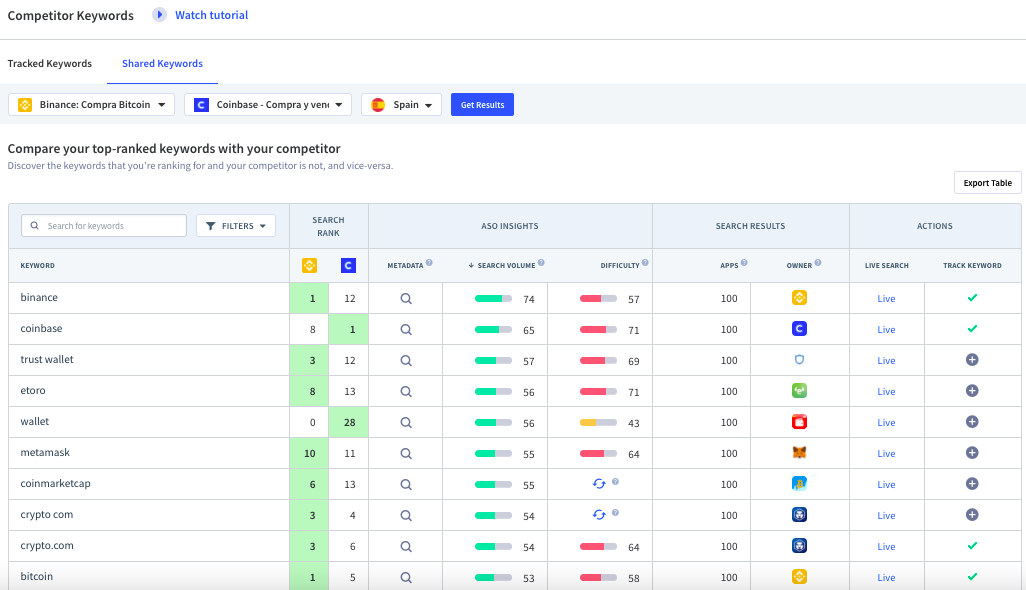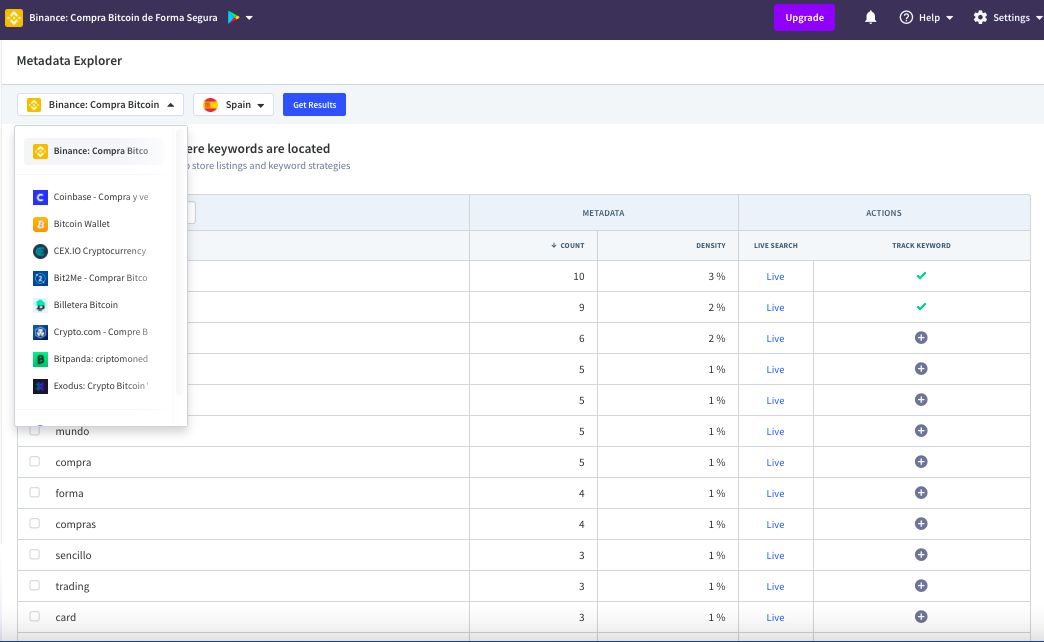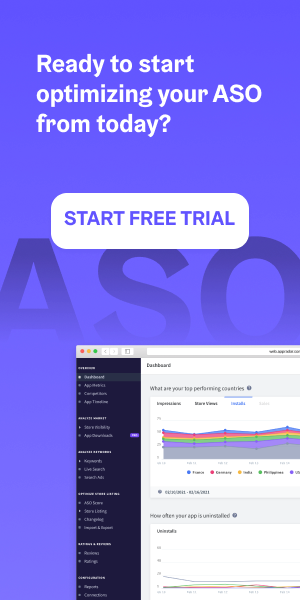In today’s article, we will see how to do a Keyword Research like a PRO for App Store Optimization with App Radar, the ASO tool that acquired TheTool earlier this year. Keyword Research is key to your ASO strategy in 2022: don’t forget about it.
Table of Contents
App Keyword Research and Optimization Process (App Store & Google Play) in 2022
To illustrate the process of Keyword Research and Optimization, we will use the keyword optimization Circle, a model that was created some time ago by our friend Pablo Penny from Phiture.
According to this model, ASO keyword optimization is a cycle of actions to follow:
- Research: create a list of all the possible keywords and combinations of keywords related to the project.
- Prioritize: Analyze and prioritize the keywords according to their relevance, difficulty and search volume / traffic.
- Target: Optimize the listing with the selected keywords.
- Measure: Follow up on the search rankings and analysis of the possible improvement.
In this post we will guide you for you to be able to do a keyword research step by step and we will help you understand how you can improve your mobile app or game visibility in Search, what generates more traffic to the listing and thus, more downloads.
ASO Keyword Research – Process and concepts
An exhaustive keyword research is an essential element to the optimization of search visibility on the app stores. It is, as we already mentioned, the first step before launching an app in the stores, and the first action to take when your mobile app or game downloads are not reaching the expected volumes of when you wish to increase the organic traffic volume and reduce the paid UA costs.
It is very important to highlight that the keyword research is not something that needs to be done once. It is a process that must be done on a regular basis: trends change, the competitors change, the app stores change…
Keyword research Step 1: Brainstorming
As a first step of your keywords investigation, think about any keywords that could refer to your app or game, whether about the type of app, its category, its main functions or the problems it solves. It is always a good idea to look for ideas in similar apps (and competitors) and to analyze ratings & reviews left by users that could contain keywords and combinations of keywords.
Try to answer the following questions during the brainstorming session:
- Who will need and therefore search for your app or game?
- What tasks do your potential users need help with?
- From where will they search for your application?
- What kind of product-level demand or functionality might your competitors be missing?
The answers to these questions will help you put yourself in the shoes of the potential users who will search the app stores. Try to understand their demand (WHAT do they need?), location (WHERE do they need it?), timing (WHEN do they want it) and WHY would your app be the best choice for them?
Write down all the keywords and keyword combinations you can think of and continue with the research.
TIP: You can use the SEMrush tool to get each and every term linked to a specific keyword. WARNING: SEMrush information is information based on Google web. That is, it can help us find terms or ideas that we had not contemplated, but we should not base our ASO strategy on the information provided by this powerful SEO tool:
In the screenshot above we can see that SEMrush returns a whopping 42,724 keywords related to the keyword “puzzle games” in Google USA web.
Keyword Research Step 2: Search for competitor keywords (and do some market research)
The perfect place to find keyword inspiration for your app or game is your direct ASO competitors.
App Radar allows you, among many other things, to quickly and easily visualize all the keywords for which any app ranks in the App Store or Google Play. It is important that you pay attention to the keywords used in the fields that have a lot of weight in the rankings (App Name / App Title, Subtitle or Short Description) and the combinations of keywords that are repeated several times in the description, especially on Google Play.
Add all the keywords you consider relevant to your list in order to analyze and prioritize them in the next steps.
How to do Keyword Research for ASO with App Radar (step-by-step)
The App Radar team, which recently acquired TheTool, is constantly releasing new features to help developers and marketers do better Keyword Research for ASO (both for App Store and Google Play), understand the effect of keyword rankings on downloads and use this information to optimize the product page more efficiently.
We believe it is interesting to group all the information about keywords that you can find in App Radar and other tools. Let’s see the main steps to follow to carry out an optimal Keyword Research and how this fantastic tool can help with it; what information to take into account when selecting keywords, analyze if we have optimized our listing correctly and how to monitor the results.
Let’s suppose we are a new app of, for example, buying and selling cryptocurrencies and we want to do a keyword research to know how we should start to position ourselves and have visibility in App Store and Google Play, with competitors as powerful as “Binance” or “Coinbase”.
To do this, we will perform an analysis with App Radar in which we will see, within the “Analyze Keywords” section, all the points that will allow us to find the best keywords for our project, both in terms of search volume or traffic, as well as in terms of relevance.
In addition to the different analyses that we must perform to know the viability of the business and the specific needs of users who want to get a return on their money through cryptocurrencies, in terms of ASO we must know that apart from the keyword research to find the corresponding keywords, we must comply with several points if we want to obtain the success we expect.
The ASO on-metadata factors, which start from the use of keywords in the store listing according to the initial research, are the pillar on which we must work the listing. But we must know that the success of our app not relies only on ASO, but also in the marketing strategies, the budget we have that will allow us to obtain a higher volume of downloads in a short time, and in the product strategies, loyalty and user experience, which will allow us to obtain reviews and positive ratings from users, key as a recommendation factor and for our app to be chosen before our competition.
Once we have added our app and our competitors in the tool, we can make a first assessment of which one to choose, choosing according to factors such as volume of ratings, reviews or accumulated average score.
In addition, we will have visibility in “Details” on other key aspects when monitoring competitors, such as whether they have been featured, if they run Apple Search Ads campaigns, or the position they occupy in the Top Charts and/or category rankings, in this case “Finance”.
Once we have identified the most interesting competitors, those that have better KPIs and perform a better ASO strategy (they are the best positioned), we move on to the next phase. To do this, we will enter the “Analyze Keywords” section where we will find everything we need to perform Keyword Research:
1.- Tracking
In this section we can see the keywords we monitor, with the tags we chose to categorize them and the “RANK” position that our app occupies for that keyword, along with the change compared to the previous period, and very interesting data on the estimated search volume and the difficulty of positioning. The tool also gives us information about the owner of that keyword, or in other words, the app with more dominance for that keyword in the last 7 days:
2.- Rankings
In this section we will obtain numerous ideas of keywords. Specifically, all those that position organically for each competitor. For example, we can take the Coinbase app as a reference and we will get 990 keywords as ideas. We can also add to “tracking” the ones we find most interesting to monitor them on a daily basis:
The “live search” column will allow us to perform real-time searches for a keyword and see the TOP XXX applications that rank for that keyword, in order to detect keywords that may have a high volume, but the results or apps that rank in top positions differ greatly from the target of our business:
3.- Finder
In this section we can explore keywords by performing an “autocomplete” simulation as if we were a real user searching in the stores. This is very useful as users often use it to refine their searches:
We can see which keywords are trending in the countries that interest us in the “Trends” section for those apps that are present in several countries:
In case we do not have enough keyword ideas so far with the Brainstorming itself (which is unlikely) we can use the “Tracking Suggestions” sections to get ideas according to our current keywords and based on our metadata combined with App Radar’s AI:
We can also search for extra ideas within the entire App Radar keyword library (+25M keywords), filtering by volume and competition, since we will not always be interested in the keywords with the highest volume:
4.- Competidor keywords
The keyword research does not end here… App Radar offers a multitude of options and ways to analyze the competition and the sector to define the best keywords for our project. In the “Competitor Keywords” section we can see, for the keywords we have monitored, the position of our app in the rankings and decide if we want to promote it by changing its location or increasing its density, or if, on the contrary, we decide that it is better to work on other keywords:
Finally, one of the most interesting features to find ranking opportunities in highly competitive verticals, since we must remember that thousands of applications are added every day on the app stores, is the “Shared Keywords” tab where we can see how our app ranks for keywords shared with our competitors:
5.- Metadata explorer
Another interesting feature to analyze competitors and get ideas of keywords is the one found in “Metadata explorer”, where we can see keywords used both by us and by the competition and their density:
Optimization: select and prioritize keywords for the product page optimization
Now that you have a complete list of possible keywords for your application, you must analyze and prioritize the search terms to optimize your product page and obtain maximum search visibility; that is, to position keywords in high positions. In case you work with Excel or Google Sheets, this tool can come in handy to convert columns of data into comma-separated lists of items. It is quite useful, really.
Things to keep in mind when selecting the best keywords for your application or game:
Traffic estimates and difficulty
To understand if a certain keyword is worthwhile, analyze its traffic and difficulty scores. Difficulty indicates the level of competition for this keyword (the higher the difficulty, the harder it is to rank for it). Traffic provides an estimated search volume for the keyword.
Try to find the perfect balance between low difficulty and high traffic. Do not make the mistake of trying to work generic keywords with high volumes; look for combinations of mid and long-tail keywords (formed by several terms).
Competitor Keyword Rankings
Tracking and comparing with your competitors is not only useful to find new keywords to use. Monitoring your competitors’ keyword rankings can help you identify possible niche and keyword rankings that your competitors may be overlooking.
Keyword installs on Google Play Store
The keyword installs functionality in App Radar allows you to view accurate data from the Google Play Console and can help you understand which keywords or keyword combinations are generating the most installs and have the best conversion and/or retention. Based on this data, you can prioritize the keywords that perform best for your app or game. This information is also available in Google Play Console.
Apple Search Ads
For iOS apps in the App Store there is a similar way to discover which keywords are the most interesting. If you are using Apple Search Ads, you can compare the Conversion Rate and Search Volume of different keywords to find out which of them can be the most relevant and interesting (and profitable) for your business.
Common mistakes to avoid when doing Keyword Research and ASO Implementation
- Using very generic and high-volume keywords. In terms of store visibility, it is better to rank in the top positions for low-traffic keywords than to rank in the Top 100-150 for high-traffic keywords. Users searching for high-volume keywords will not have the opportunity to discover your application if it is not ranked in the first positions.
- Not using enough combinations. More than 75% of the visits to an app’s store listing come from long-tail keyword combinations, so instead of struggling to rank for high-volume keywords, expand the number of long-tail keyword combinations to use in your textual fields.
- Working with few keywords. According to this study, the top apps, on average, rank for a LOT of keywords. (iOS apps: 65-110 keywords; Android apps: 60-105 keywords). Work as many keywords as possible.
- Not using the most relevant and highest traffic keywords in App Name / App Title. This is important, both for visibility and for conversion rate to download.
Studying the market and competition constantly is the key to success in ASO and App Radar makes it very easy for us to understand how the market evolves and to adapt quickly, thus being able to obtain enough objective data to optimize our product pages.
What do you think of this extensive guide on keyword research for ASO? Feel free to comment below.
PS: Use the code “AppRadar_Daniel” when you sign up to App Radar to enjoy a fantastic 30% discount for 3 months.

